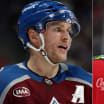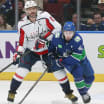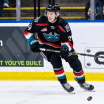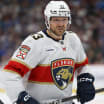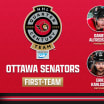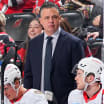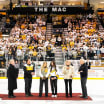NHL.com's Q&A feature called "Five Questions With…" runs every Tuesday. We talk to key figures in the game and ask them questions to gain insight into their careers and the latest news. The latest edition features Jillian Reddin, director of hockey operations for San Diego, the American Hockey League affiliate of the Anaheim Ducks.
Five Questions with Jillian Reddin
Daughter of Ducks owners making impact with team's AHL affiliate
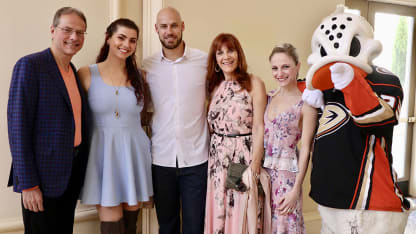
Jillian Reddin's love of sports was apparent from an early age.
Reddin, director of hockey operations for San Diego, the American Hockey League affiliate of the Anaheim Ducks, was one of three daughters born to Ducks owners Susan and Henry Samueli. She said she was definitely the tomboy of the group.
"I was like the boy my dad never had," Reddin said with a laugh. "I loved going to sporting events. We all went in different directions. I was the one who chose the sports side and just started as an intern within the company [Ducks] and worked my way up. This is 12 years in the making, and it's just been so much fun.
"I chose the hockey side because that was obviously the most exciting and most fun. There's just so much growth within that, so really that's how it all started. My parents threw the idea and threw me into the fire and said, 'Have at it,' which I did."
It hasn't always been the easiest road for Reddin, who is in her fifth season with San Diego. But it's been a rewarding one.
Here are Five Questions with … Jillian Reddin.
What does Gender Equality Month mean to you?
"To be honest, it wasn't something I truly thought about in recent years. When I started this job in sports 12 years ago, there weren't many women doing what I was doing. So I just had to adapt to a men's mentality and just get thick-skinned, because you can imagine there was a lot of questioning, sarcasm, jabs directed toward me. I just had to take a grain of salt and brush it off and prove them wrong, which I did. But it took some time to do so and to earn that respect and for my voice to be heard. You're going into a fraternity, as I like to call it, and they don't welcome you firsthand. You have to earn it and work for it. and they break you down to see how weak you are before you're picked back up.
"With that being said, I feel like the strong woman I am today is from what I had to prove and still proving to be accepted into this man's world of sports -- and I'm better from it. It wasn't easy and there was a ton of self-doubt, but I wasn't going to give up. Seeing all these women joining the industry is awesome and I'm glad it's happening. I feel like women can give so much to this industry, and we all know that men know that as well, but they're not willing to say it. I feel the future is so bright for us women in the sporting industry, and I feel we're skimming the surface. There's lots to be done, don't get me wrong. But the more we come together and highlight the importance and value women have in sports, the more likely our next generation of these young women will realize they can keep this dream too. That's what I feel."
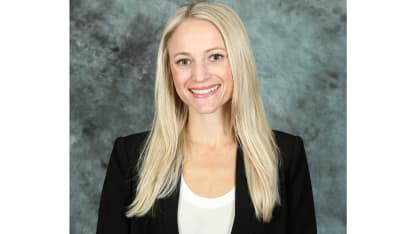
What was it like taking your first job outside of the Ducks organization?
"It was when I started in the AHL as the coordinator of hockey operations. That was when I moved to Syracuse [to work for the Crunch] some 12 years ago. I just had the responsibility of taking the players under my wing and doing their contracts, doing the paperwork that's filed with the league, pretty much doing what I'm do now but as a coordinator -- basically, help running the hockey side of the Crunch back then. That was my first time moving away from my family and California and living on the East Coast by myself, not knowing what I'm getting into. It was a great experience and paved my way for who I am today. They threw me in and told me to figure it out."
How frustrating were those early years of trying to prove yourself?
"It was super frustrating. I was in my early 20s back then, so you can imagine I'm a little 20-something girl coming from California, not really knowing much about the sport and trying to prove myself. I'm walking into this board room of grown men; it was hard. They look at me like, 'What are you doing here? You know nothing about hockey. It's your last name, your parents are giving this to you. How are you going to prove to us that you know the sport and this realm?' I almost broke down, and I almost walked out a couple of times because it was hard. At that age, you're just so naïve and you just want to be welcomed and be accepted. But I got through it and I got a lot of help from [Gulls general manager] Bob Ferguson. He directed me in the right direction and said, 'Hang in there, I know you can do this, I know you have the knowledge; be a sponge and just accept that and just take what they're saying and learn about it and come back and you'll be better from it.' So there's a lot of me being a sponge in the first half of what I was doing to prove to them that I knew what I was here to do and I know about this sport and everything."
How much vindication is there for you today, with where you are?
"It's nice, I'm not going to lie. But it's also humbling to know that, yes, I agreed with them that, I was not as knowledgeable as I am today. But to have them say, 'I was wrong,' and then accepting it, it's empowering. It's not a win, because I still have a lot more to do. But it's definitely impactful and pretty awesome. That's the best way I can put it."
Are you encouraged by the progress we're making?
"We do have a long way to go, but we're definitely stepping in the right direction. Women have such a different mindset than men in terms of how they think and what they bring to this sport that I think it's going to be really interesting to see how it pans out. That all-women's broadcast [of the St. Louis Blues-Chicago Blackhawks game by NBCSN on March 8] -- I recorded it because I want to watch it over and over again. It was pretty impactful. At first it was almost like, 'Is this really happening?' But I definitely feel like we're going in the right direction. Just having women and their big names and their big voices and opinions within every realm of hockey or sports in general, it's going to be really impactful."

